SWAP'ra Gala, Opera Holland Park review - all-women stars and scenes | reviews, news & interviews
SWAP'ra Gala, Opera Holland Park review - all-women stars and scenes
SWAP'ra Gala, Opera Holland Park review - all-women stars and scenes
Much supernaturally beautiful singing for a practical cause
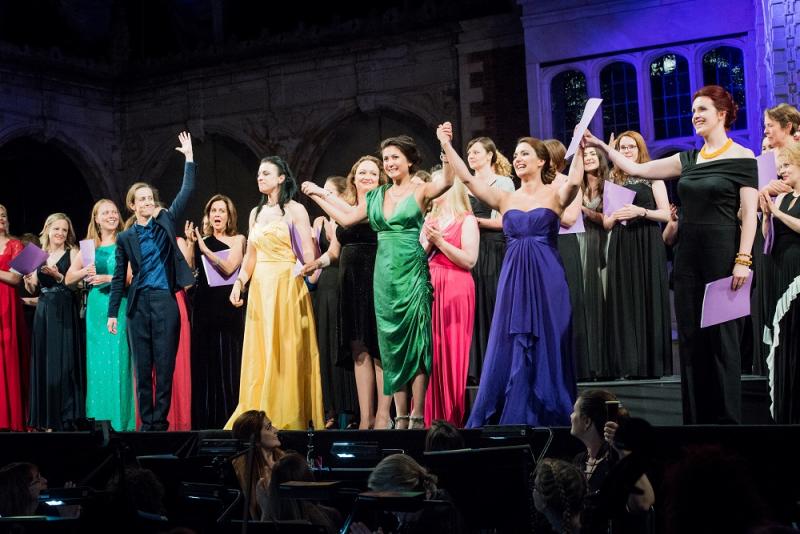
Two women, Julia Sporsén's female Composer and Jennifer France's Zerbinetta in Strauss's Ariadne auf Naxos, stole most hearts with their togetherness at Holland Park recently.
The wider aims of the newly founded SWAP'ra - Supporting Women and Parents in Opera - include encouraging leaders in the field who redress the balance so that we end up no longer appending "women" to conductors, directors and composers; check out the neatly-presented percentages on the organisation's excellent website if you don't think there's a problem. More specifically, it already has two firm objectives: to encourage directors and companies to give out schedules well in advance to enable family planning, so to speak, and to get more opera houses to provide creche/childcare facilities, as OHP and Scottish Opera already do. 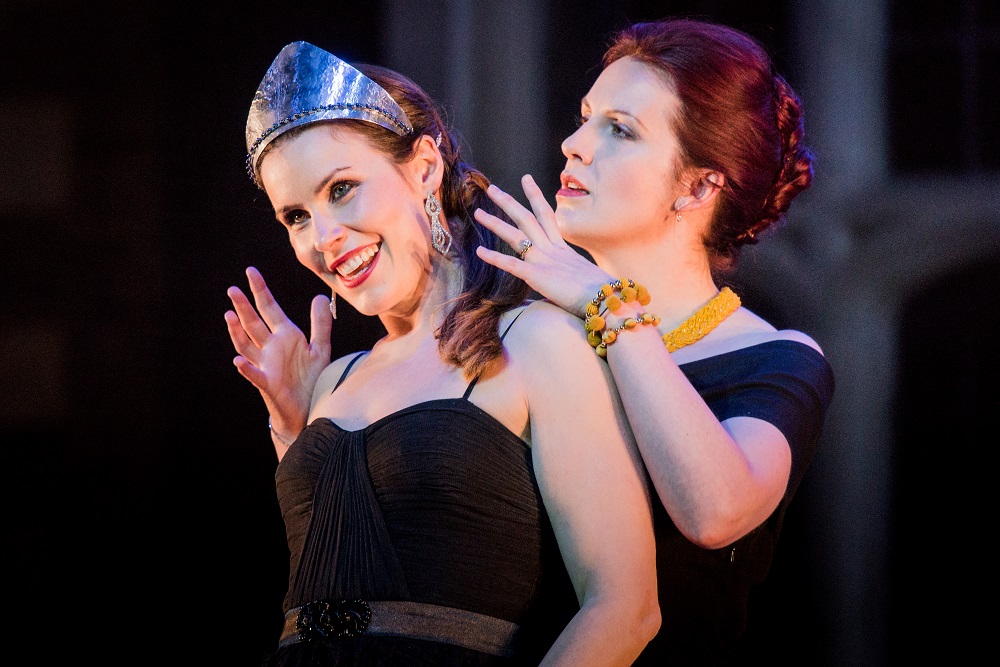 Founder members - the directors Ella Marchment and Sophie Gilpin along with singers Anna Patalong, Madeleine Pierard and Kitty Whately (pictured above as Monteverdi's Nero - nominally, at least, since the final duet is by another composer - to Anna Devin's Poppea) - did a slick shared job of presenting their cause; then the ever-spirited Fiona Shaw spoke further on the necessities of the life-work balance before introducing no less than 17 operatic excerpts familiar and not, featuring 42 soloists, two choruses, four conductors led by the engaging Jessica Cottis in charge of a full orchestra, and 10 directors.
Founder members - the directors Ella Marchment and Sophie Gilpin along with singers Anna Patalong, Madeleine Pierard and Kitty Whately (pictured above as Monteverdi's Nero - nominally, at least, since the final duet is by another composer - to Anna Devin's Poppea) - did a slick shared job of presenting their cause; then the ever-spirited Fiona Shaw spoke further on the necessities of the life-work balance before introducing no less than 17 operatic excerpts familiar and not, featuring 42 soloists, two choruses, four conductors led by the engaging Jessica Cottis in charge of a full orchestra, and 10 directors.
Galas are tricky things, especially when you're aiming as they were last night straight for the deeply emotional essence. You can't do such things on a wing and a prayer; owing to the generosity of the performers in squeezing appearances into a busy schedule, time here must have been short. So inevitably there was some unevenness in presentation, the sense that some scenes could have been more extended for full impact and others placed differently in the programme. But overall they got the balance right, and did us all especially proud in bringing to light the new. 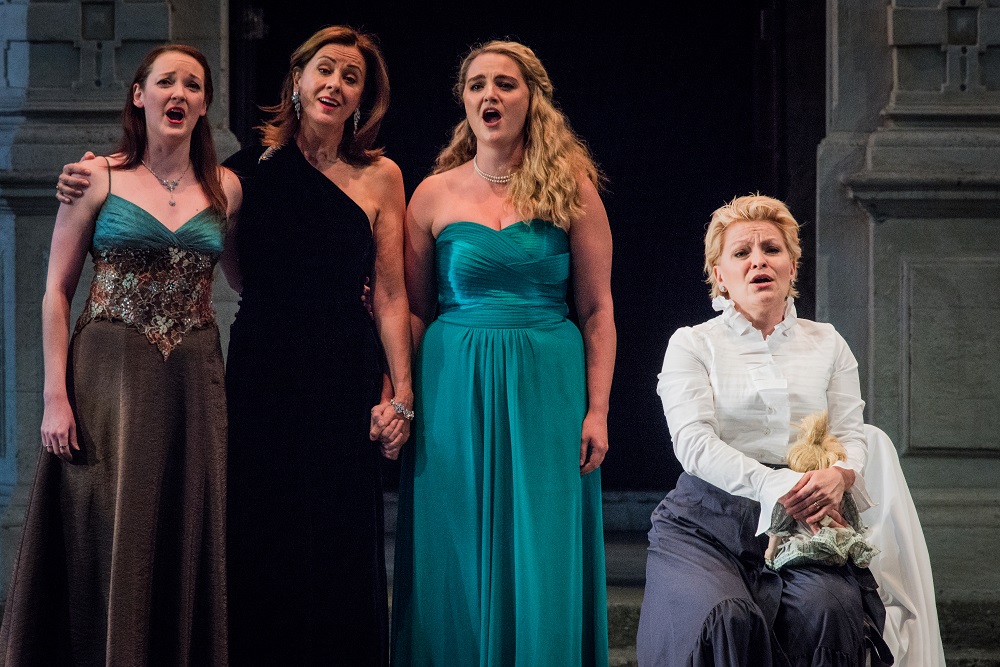 Mark Adamo's Little Women hasn't been seen in the UK; its quartet finale is, perhaps inevitably, American-sentimental, but not necessarily in a bad sense, and its emotion was finely trammelled by Jennifer France's Amy, Rebecca Caine's Beth, Beth Moxon standing in for Karen Cargill as Meg and Lucy Schaufer as Jo (pictured above). We had a sneak preview of Welsh National Opera-commissioned Rhondda Rips It Up! by Elena Langer, catching not the promised raciness of its music-hall style but the pathos with Emma Carrington in the prison solo of Welsh suffragette Margaret Haig Thomas, Lady Rhondda. The real modernism came in a taster of Josephine Stephenson's Les constellations, une théorie, bewitchingly articulated by Gillian Keith and Caroline MacPhie (pictured below) in perfect accord with Cottis and the orchestra - the most surprising highlight.
Mark Adamo's Little Women hasn't been seen in the UK; its quartet finale is, perhaps inevitably, American-sentimental, but not necessarily in a bad sense, and its emotion was finely trammelled by Jennifer France's Amy, Rebecca Caine's Beth, Beth Moxon standing in for Karen Cargill as Meg and Lucy Schaufer as Jo (pictured above). We had a sneak preview of Welsh National Opera-commissioned Rhondda Rips It Up! by Elena Langer, catching not the promised raciness of its music-hall style but the pathos with Emma Carrington in the prison solo of Welsh suffragette Margaret Haig Thomas, Lady Rhondda. The real modernism came in a taster of Josephine Stephenson's Les constellations, une théorie, bewitchingly articulated by Gillian Keith and Caroline MacPhie (pictured below) in perfect accord with Cottis and the orchestra - the most surprising highlight. 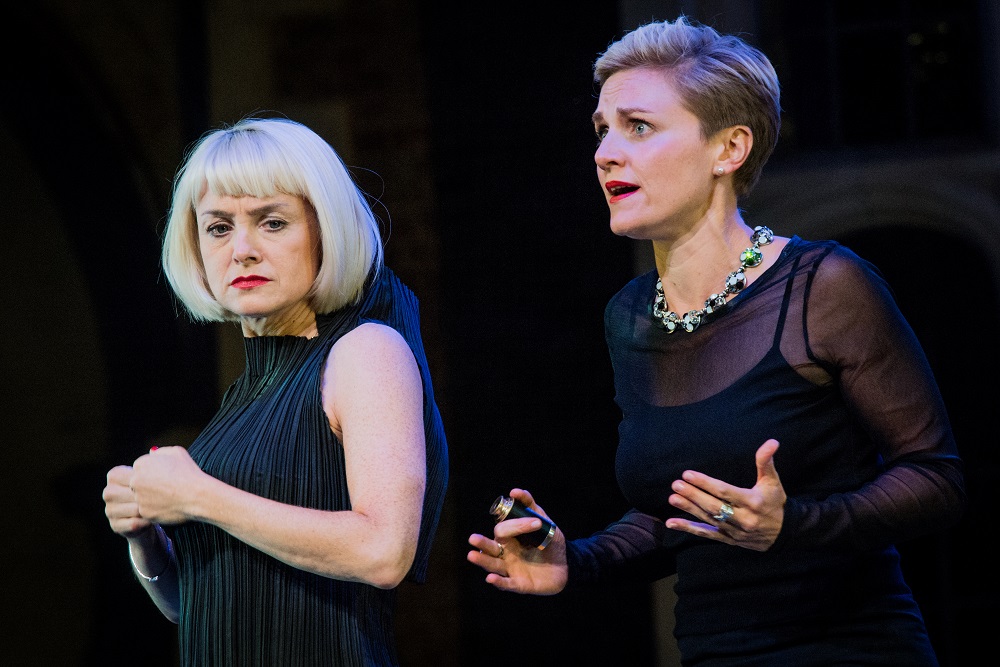 As all works were sung in their original languages - Stephenson's in excellent French - there was a challenge to put across the meaning. Top-notch in that respect were Jeni Bern's unusual, modern Fiordiligi in tandem with Sarah Tynan's experienced Despina and Katie Bray's Dorabella, and Catherine Wyn-Rogers' obdurate but not inhuman Zia Principessa giving Puccini's adored Suor Angelica (Anne Sophie Duprels) the awful news about the child from whom she's been separated. The women's quartet from Act 2 of Britten's Peter Grimes also went straight to the heart, with measured characterisations from Giselle Allen (Ellen Orford), Yvonne Howard (Auntie) and Rebecca Bottone and Gillian Ramm as the Nieces (pictured below).
As all works were sung in their original languages - Stephenson's in excellent French - there was a challenge to put across the meaning. Top-notch in that respect were Jeni Bern's unusual, modern Fiordiligi in tandem with Sarah Tynan's experienced Despina and Katie Bray's Dorabella, and Catherine Wyn-Rogers' obdurate but not inhuman Zia Principessa giving Puccini's adored Suor Angelica (Anne Sophie Duprels) the awful news about the child from whom she's been separated. The women's quartet from Act 2 of Britten's Peter Grimes also went straight to the heart, with measured characterisations from Giselle Allen (Ellen Orford), Yvonne Howard (Auntie) and Rebecca Bottone and Gillian Ramm as the Nieces (pictured below). 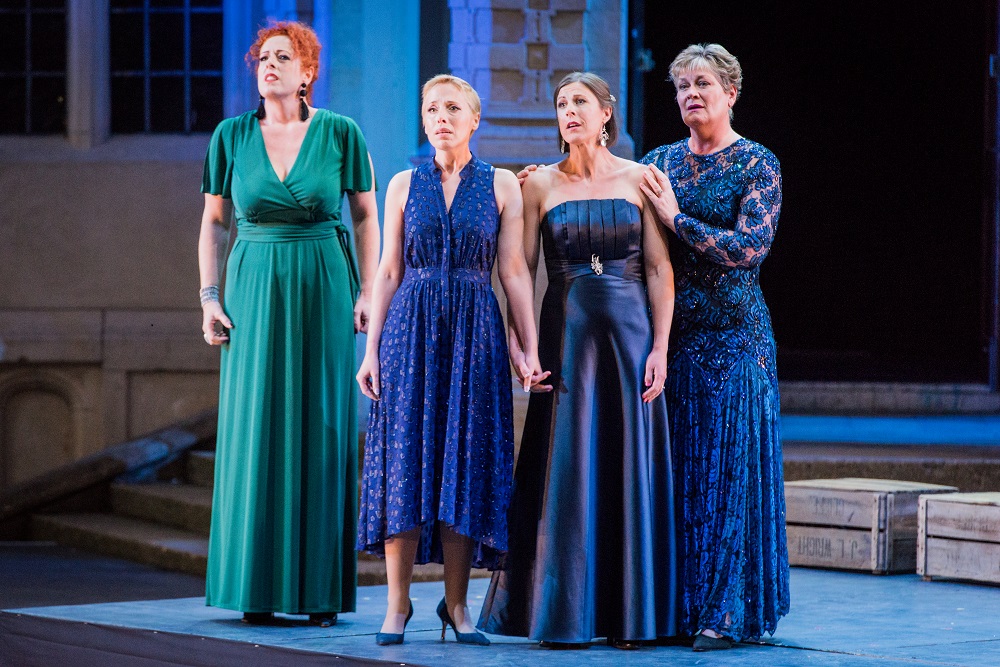 Amidst the luxury of great British names - Amanda Roocroft, poised and gracious as ever, moving from her memorable Tatyana at the Royal Opera to the charming mother (pictured below with Katherine Broderick as Tatyana, Angela Simkin as Olga and Fiona Kimm as Filipyevna), Janis Kelly as the Marschallin to the Octavian of Diana Montague, still in fine voice - there were reminders of the outstanding voices many of us have been missing. Outstandingly so Meeta Raval, whom I haven't seen since her distinguised performance in the 2013 BBC Cardiff Singer of the World final, as a perfect-phrasing Butterfly, in tandem with Carolyn Dobbin's equally lustrous Suzuki (shame they had to do pointless things with crates; scattering blossoms would have been enough not to get in the way of this musically ravishing Flower Duet).
Amidst the luxury of great British names - Amanda Roocroft, poised and gracious as ever, moving from her memorable Tatyana at the Royal Opera to the charming mother (pictured below with Katherine Broderick as Tatyana, Angela Simkin as Olga and Fiona Kimm as Filipyevna), Janis Kelly as the Marschallin to the Octavian of Diana Montague, still in fine voice - there were reminders of the outstanding voices many of us have been missing. Outstandingly so Meeta Raval, whom I haven't seen since her distinguised performance in the 2013 BBC Cardiff Singer of the World final, as a perfect-phrasing Butterfly, in tandem with Carolyn Dobbin's equally lustrous Suzuki (shame they had to do pointless things with crates; scattering blossoms would have been enough not to get in the way of this musically ravishing Flower Duet). 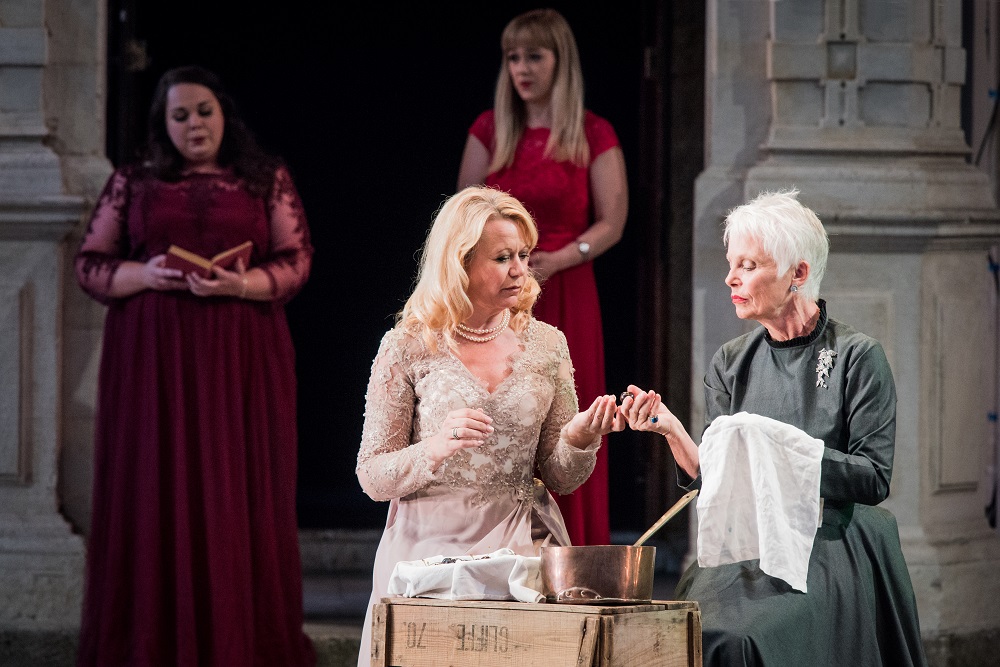 Clearly we should see Jennifer Johnston as Britten's Lucretia soon, and there was poised perfection from Whately's Nero and Devin's Poppea. This was a lesson in restrained but telling direction from Robin Norton-Hale, who also handled Constellations so well.
Clearly we should see Jennifer Johnston as Britten's Lucretia soon, and there was poised perfection from Whately's Nero and Devin's Poppea. This was a lesson in restrained but telling direction from Robin Norton-Hale, who also handled Constellations so well.
As the full company finally assembled for a lusty group finale singing an anthem by Pankhursts young and old, there was just one nagging question: you're cracking the women issue, with which of course there's never been a problem as far as operatic roles are concerned; it's in the other fields that attention needs to be paid. But what about the diversity? Next stop, obviously, Chineke! in opera.
The future of Arts Journalism
You can stop theartsdesk.com closing!
We urgently need financing to survive. Our fundraising drive has thus far raised £49,000 but we need to reach £100,000 or we will be forced to close. Please contribute here: https://gofund.me/c3f6033d
And if you can forward this information to anyone who might assist, we’d be grateful.

Subscribe to theartsdesk.com
Thank you for continuing to read our work on theartsdesk.com. For unlimited access to every article in its entirety, including our archive of more than 15,000 pieces, we're asking for £5 per month or £40 per year. We feel it's a very good deal, and hope you do too.
To take a subscription now simply click here.
And if you're looking for that extra gift for a friend or family member, why not treat them to a theartsdesk.com gift subscription?
more Opera
 Káťa Kabanová, Glyndebourne review - emotional concentration in a salle modulable
Janáček superbly done through or in spite of the symbolism
Káťa Kabanová, Glyndebourne review - emotional concentration in a salle modulable
Janáček superbly done through or in spite of the symbolism
 Buxton International Festival 2025 review - a lavish offering of smaller-scale work
Allison Cook stands out in a fascinating integrated double bill of Bernstein and Poulenc
Buxton International Festival 2025 review - a lavish offering of smaller-scale work
Allison Cook stands out in a fascinating integrated double bill of Bernstein and Poulenc
 Tosca, Clonter Opera review - beauty and integrity in miniature
Happy surprises and a convincing interpretation of Puccini for today
Tosca, Clonter Opera review - beauty and integrity in miniature
Happy surprises and a convincing interpretation of Puccini for today
 Hamlet, Buxton International Festival review - how to re-imagine re-imagined Shakespeare
Music comes first in very 19th century, very Romantic, very French operatic creation
Hamlet, Buxton International Festival review - how to re-imagine re-imagined Shakespeare
Music comes first in very 19th century, very Romantic, very French operatic creation
 Falstaff, Glyndebourne review - knockabout and nostalgia in postwar Windsor
A fat knight to remember, and snappy stagecraft, overcome some tedious waits
Falstaff, Glyndebourne review - knockabout and nostalgia in postwar Windsor
A fat knight to remember, and snappy stagecraft, overcome some tedious waits
 Salome, LSO, Pappano, Barbican review - a partnership in a million
Asmik Grigorian is vocal perfection in league with a great conductor and orchestra
Salome, LSO, Pappano, Barbican review - a partnership in a million
Asmik Grigorian is vocal perfection in league with a great conductor and orchestra
 Semele, Royal Opera review - unholy smoke
Style comes and goes in a justifiably dark treatment of Handelian myth
Semele, Royal Opera review - unholy smoke
Style comes and goes in a justifiably dark treatment of Handelian myth
 Le nozze di Figaro, Glyndebourne review - perceptive humanity in period setting
Mostly glorious cast, sharp ideas, fussy conducting
Le nozze di Figaro, Glyndebourne review - perceptive humanity in period setting
Mostly glorious cast, sharp ideas, fussy conducting
 Fidelio, Garsington Opera review - a battle of sunshine and shadows
Intimacy yields to spectacle as Beethoven's light of freedom triumphs
Fidelio, Garsington Opera review - a battle of sunshine and shadows
Intimacy yields to spectacle as Beethoven's light of freedom triumphs
 Dangerous Matter, RNCM, Manchester review - opera meets science in an 18th century tale
Big doses of history and didaction are injected into 50 minutes of music theatre
Dangerous Matter, RNCM, Manchester review - opera meets science in an 18th century tale
Big doses of history and didaction are injected into 50 minutes of music theatre
 Mazeppa, Grange Park Opera review - a gripping reassessment
Unbalanced drama with a powerful core, uninhibitedly staged
Mazeppa, Grange Park Opera review - a gripping reassessment
Unbalanced drama with a powerful core, uninhibitedly staged
 Saul, Glyndebourne review - playful, visually ravishing descent into darkness
Ten years after it first opened Barrie Kosky's production still packs a hefty punch
Saul, Glyndebourne review - playful, visually ravishing descent into darkness
Ten years after it first opened Barrie Kosky's production still packs a hefty punch

Add comment